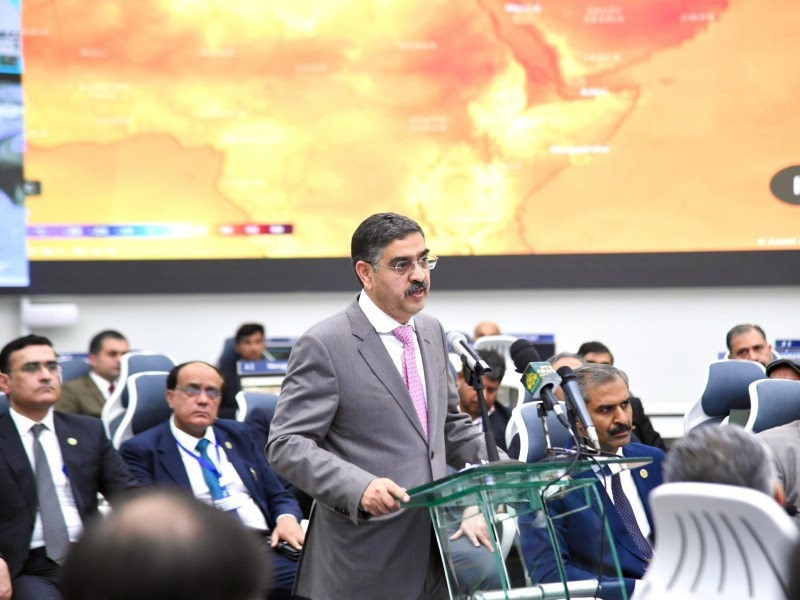
Caretaker Prime Minister Anwaarul Haq Kakar disclosed on Monday that 27,000 vehicles of smuggled Iranian oil were illegally entering Pakistan daily with the connivance of local officials -- a rare admission that also exposes the deep-rooted nexus between the smugglers and their benefactors.
In an informal interaction with media persons, the country’s chief executive further said that the menace of smuggling of goods and foreign currency was posing an “existential threat to Pakistan”.
About 27,000 vehicles of smuggled Iranian oil were entering Pakistan on a daily basis by giving Rs125,000 to Rs150,000 per vehicle bribe to the concerned deputy commissioner, the prime minister revealed. He said that the deputy commissioner was also giving shares to those who were instrumental in these postings.
He said that the illegal cross-border movement of the vehicles has almost been stopped, although not yet to a complete halt.
“Smuggling and illegal foreign currency trade were posing an existential threat to Pakistan and had we not launched the crackdown, the rupee-dollar price would have crossed Rs350 to a dollar”, said the PM.
The military and the civil leadership launched a decisive campaign against the smuggling –the second in the past three years but this time the scale of the crackdown seems larger and deeper.
Read Smugglers, hoarders to face ‘state’s wrath’
It was my decision to stop the smuggling of Iranian oil to Pakistan and the military played a major role in the crackdown, said the PM. Before August, the smuggling of Iranian oil was considered legal by many, he added.
The prime minister said the unemployment in Balochistan has been used as an excuse to promote and protect smuggling. The government positions are deliberately kept vacant to use unemployment as an argument for the continuation of smuggling in Balochistan, said the PM.
In 2020, the then government had also launched a crackdown against smuggling of POL products from Iran, estimated at US$ 2 billion per annum at the time.
Supply routes of illegal POL products through Baluchistan to the rest of the country were choked three years ago. As a result, 1,674 illegal POL retail outlets were sealed, 1,155 FIRs were lodged against the owners of these illegal outlets and 781 applications for freezing of assets were moved in light of relevant provisions of Customs Act, 1969.
A 2018 study by the customs department revealed that in the case of only 11 commodities, the national exchequer sustained a revenue loss of about $3.5 billion in terms of duties and taxes.
Meeting with IMF
The PM also spoke about his meeting with the Managing Director of the IMF on the sidelines of the United Nations General Assembly session.
The PM briefed Kristalina Georgieva about the efforts that Pakistan was making to curb the smuggling of foreign currency. The PM said that he apprised the MD that Pakistan did not use its thin foreign exchange reserves to bring down the value of the dollar against the rupee.
The IMF is primarily an economic tool and I do not see any political angle to it, said Kakar while responding to a question whether the global lender would give a new loan to Pakistan if elections are delayed beyond January.
“The probability is that they would engage with Pakistan as they have been engaging with both the elected and non-elected governments across the world”, said Kakar.
Pakistan’s current IMF programme is expiring on April 12th next year and the country’s economic conditions warrant another long-term IMF deal, which many see can only happen after the next general elections.
After meeting with the PM, the IMF MD emphasised taxing the rich people.
It was not the managing director of the IMF that raised the question of taxing the rich, rather, I briefed her that Pakistan would tax its rich people, said the PM.
“I want to tax the lawyers, doctors, media persons, media owners and retailers”, said the PM. He stated that everyone has to pay due taxes.
“Pakistan wants to reform the tax system out of conviction, not under pressure by the IMF”, said Kakar while sharing details of his meetings with the Managing Director of the IMF, Kristalina Georgieva.
To a question about expanding the role of the military-dominated Special Investment Facilitation Council to areas that are not defined in the governing law, the PM said that the Board of Investment amended Act gives the federal government a mandate to bring any new area into the fold of the Council through a gazette notification.
The Express Tribune reported last week that the SIFC role has been expanded to areas, which are domestic in nature and involve as small issues as providing gas to housing societies or setting priority in allocation of gas to various economic sectors.
To another question, the PM said no new notification has yet been issued to bring new areas in the SIFC fold.
The law says that the SIFC shall facilitate investment and privatisation in areas, including, but not limited to, defence, agriculture, infrastructure development, strategic initiatives, logistics, minerals, information technology, telecommunication and energy and shall take all necessary measures in order to establish, facilitate, encourage and promote opportunities for investment, as well as, inter alia, business in and for Pakistan.
Another section of the law says that the federal government may notify any other area, sector, industry or projects as Relevant Field through a notification in the official Gazette to be processed under this Chapter.
While speaking about privatisation, the PM said that the government would outline its policy by December this year to stem losses caused by the power distribution companies. He said that various proposals were under consideration, which includes signing concession agreements with the private sector and handing over these companies to the provinces.
The PM also responded to questions about action against the PTI workers and Pakistan’s policy about illegal Afghan immigrants.
Pakistan is expelling only those foreigners who have illegally entered the country and do not have any legal basis to stay back, said Kakar while defending the government’s policy of repatriation of illegal immigrants. “No country in the world can stop us from taking action against aliens”, said Kakar.
To a question about providing a level playing field to all political parties, the PM said that PTI is a political and legal entity and its supporters enjoy all the rights, which the constitution ensures to any political party. There would not be any intervention by any institution in the elections, said the premier.
‘Neutrality and transparency’
Separately speaking during an interview, the premier said that while pursuing the guiding principles of transparency, neutrality and fair play, his government would ensure that no political party had any fear or favour while undergoing the electoral process.
The prime minister, in an interview with a private television channel, rubbished the notions of his government favouring the PML-N and said usually the political parties attracted their voters through such impressions.
Read more Crackdown launched against oil smuggling
Regarding the date for elections, he said through legislation, the previous parliament had given the mandate to the Election Commission of Pakistan (ECP). However, as far as the government’s role was concerned, they were ready to provide funding and security for the elections, he added.
Ruling out any threat to the PTI chief’s life in jail, the prime minister said the caretaker government would ensure the provision of facilities to him as per his entitlement.
To a question, the prime minister said there was no formal requirement for the caretaker government’s consultation with the President for the electoral process. However, the government would surely respond whenever they got any queries from the president as they maintained a respectful relationship.
The prime minister said he had need-based interaction with the president – in a reasonable environment – on three to four occasions.
Asked about the PTI’s apprehension of being barred from electioneering, he said there was no law, executive order, or administrative order keeping PTI off from the process. Referring to the arrest of the people involved in the riots of May 9, he said calling the legal action bar from the electoral process was unfair.
To a query, he said the government had not received any complaint against any enforced disappearances in Punjab.
However, he said it was the state’s inherent right to apprehend the people accused of any law violation. Commenting on JUI-F chief Maulana Fazlur Rehman's suggestion of delaying polls citing snowfall season in some parts of the country, he said the government would not hold elections based on the input from the Met Office rather it was up to the ECP to decide the date. He said the country was faced with security and economic challenges and besides holding the polls, the government would prioritise the protection of people’s lives and properties.


















1715945060-0/BeFunky-collaged-(2)1715945060-0-270x192.webp)


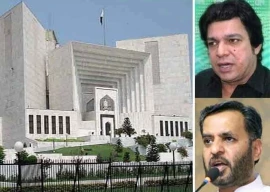

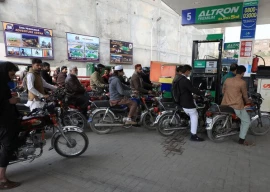
1715843823-0/WhatsApp-Image-2024-05-16-at-12-14-16-(1)1715843823-0-270x192.webp)
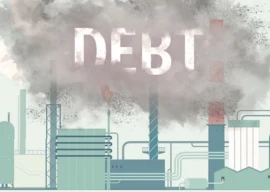
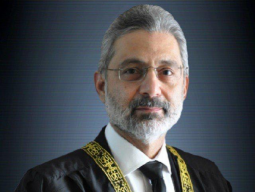
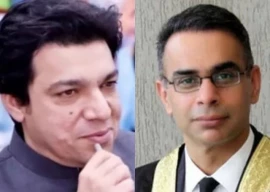






COMMENTS
Comments are moderated and generally will be posted if they are on-topic and not abusive.
For more information, please see our Comments FAQ